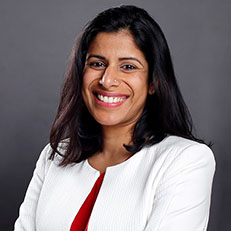Print-quality photo
Dr. Shahzeen Attari’s research focuses on the psychology of resource use and how to motivate action on climate change. Attari and her lab work on problems that draw on both cognitive and environmental science, and focus on perceptions, motivations, and biases related to climate change and sustainability.
Attari’s work has been published in leading science journals such as the Proceedings of the National Academy of Sciences and Climatic Change, and has received media attention from major news outlets including the BBC, The Economist, The New York Times, and NPR.
Prior to working at Indiana University, Attari was a postdoctoral fellow at the Earth Institute and the Center for Research on Environmental Decisions (CRED) at Columbia University. She holds a Ph.D. in Civil and Environmental Engineering & Engineering and Public Policy from Carnegie Mellon University, and a Bachelors of Science in Engineering Physics from University of Illinois at Urbana-Champaign.


